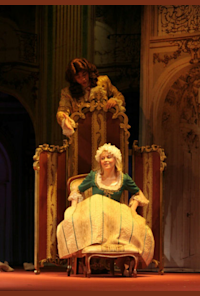The opera (created as a "comic intermezzo") "Pimpinone, or Unequal Marriage" by G. F. Telemann was first performed on September 27, 1725 in Hamburg between acts of G. F. Handel's opera "Tamerlane". The libretto by P. Pariati was originally intended for the Italian composer T. Albinoni. The librettist I.F. Pretorius made a German edition of it. The premiere was such a success that Pretorius and Telemann wrote a new opera with a continuation of the story - Vespetta's Cupid or Galan in a Box.
The plot of Pimpinone anticipated G. B. Pergolesi’s The Servant-Mistress, created a few years later: the pretty maid Vespetta (translated from Italian as “little wasp”) seduces her master Pimpinone and marries him. After that, an old man in love, but unhappy in marriage, has to endure the whims of his wife. Having taken possession of his house and wallet, Vespetta subjugates her husband.
In the 19th century, the opera Pimpinone, like Telemann's other operas, was forgotten. The revival of interest in it began with the performance in 1929 in Telemann's homeland - in Magdeburg and the subsequent publication of the score
in Mainz (1936). In the second half of the 20th century, the opera gained popularity in Germany and Austria in the interpretations of outstanding conductors (Helmut Koch, Helmut Rilling, Michael Schneider, etc.). In our time, Telemann's Pimpinone is one of the most sought-after operas in the Baroque repertoire. It goes on the stages of many theaters in Europe and the USA: in Belgrade, Brandenburg, Mainz, Nuremberg, Turin, Boston, New York, etc.
The premiere of the opera "Pimpinone" at the Chamber Musical Theater took place on March 25, 1983. The founder of the theater Boris Pokrovsky invited his student, the Estonian director Arne Mikk, to stage it. Conductor Vladimir Agronsky and stage designer Yulia Aks became its co-authors. The opera was in Russian, translated by Irina Maslennikova. The resumption of the performance took place in 2009 under the direction of another student of Pokrovsky - Valery Fedorenko.
The traditional and at the same time witty staging, the rapid development of the plot of the short comic opera makes it one of the most sought-after in the repertoire of the Chamber Stage of the Bolshoi Theater. The performance is being staged - now on the Chamber Stage of the Bolshoi Theater - on the same evening as W. A. Mozart's opera The Theater Director.



